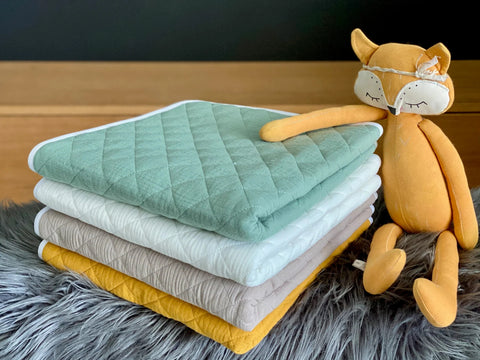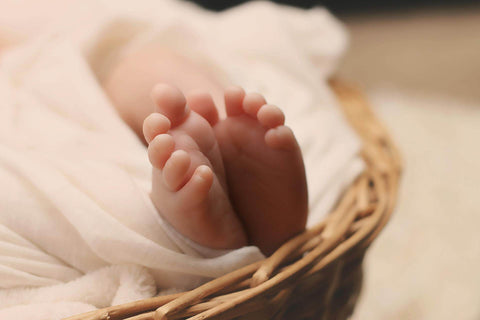
Burps help babies get rid of the air they swallow during feeding, which is essential for preventing bloating, stomach pain and restlessness. Air in the stomach is a common phenomenon as small children often swallow air when drinking from the breast or bottle. This leads to a need to burp to eliminate the air bubbles that cause discomfort in the stomach.
Methods to support
- Positioning after feeding: Keeping the baby in an upright position immediately after feeding makes burping easier. The most common method is to place the baby over the shoulder, with the baby's stomach pressed slightly against the mother or father's shoulder.
- Gently tapping on the back: Gently patting or stroking the baby's back can help move air up and encourage burping.
- Changing feeding positions: Changing positions when breastfeeding or bottle feeding can also help reduce the amount of air that is swallowed. Positions that hold the baby at a slight angle are often helpful.
- Breaks during feeding: It is beneficial to take short breaks during feeding to allow the baby to burp, especially if he is feeding quickly or is restless.
Importance of patience and routine
Burping is an essential part of infant care that is often underestimated. After feeding, it can sometimes seem as if the longed-for burp will never come. Patience is required here. It is important to remember that every baby is individual and therefore needs a different amount of time to burp air. Some babies can burp quickly and almost reflexively, while others need more time and reassurance.
A consistent routine not only helps your baby learn what to expect after feeding, but also helps you as a parent develop calm and confidence in the process. Allowing enough time for burping after each feeding is crucial. This time not only provides space for burping, but also promotes a valuable bond between you and your baby. Skin-to-skin contact, soothing words and gentle touch can increase your baby's well-being in these moments and become a calming routine.
Holding the baby in the correct position is central. Most parents find that holding the baby over the shoulder, where the tummy gets light pressure against the shoulder, is effective. Others prefer to sit the baby on their lap and gently tip it back and forth. It's important to try different positions to see which one helps your baby the most.
It is also important to pay attention to your baby's signals during this time. Some toddlers become restless when they have difficulty belching air, while others may cry or squirm. Recognizing these signs and adjusting your technique can make the process easier for both parties.
Dealing with difficulties
Inducing a burp in a toddler can sometimes be a challenge, especially if the baby is one of those who doesn't burp easily. However, it is important to remember that this is a completely normal part of baby care and not a cause for concern. Every baby is unique, and what works for one may not necessarily work for another.
The development of the ability to farm independently
A baby's ability to burp independently is a significant milestone in their development that shows they are beginning to gain more control over their body. This ability does not develop overnight, but is the result of a gradual process closely linked to the child's overall physical development.
During the first weeks and months of life, infants rely largely on parents or caregivers to help them release the air they swallow while drinking. This is because their muscles and digestive system are not yet fully developed. However, babies learn quickly and begin to show signs of independence around 4 to 6 months of age, including the ability to burp without assistance.
This development often coincides with other milestones, such as beginning to roll over, sit up, or try solid foods. These physical advances help the muscles in the abdominal area become stronger and the baby begins to control his body motor skills more effectively. This improved control helps him to release air on his own after eating or drinking.
FAQ
How long does it take for baby to burp?
The time it takes for a baby to burp can vary greatly and depends on various factors, such as the amount of air ingested during feeding and the baby's individual digestion. Typically it can take a few seconds to several minutes. It is important to remain calm and patient, even if it sometimes takes longer.
A relaxed atmosphere and a comfortable position for the baby can make the process easier. If the baby hasn't burped after about 5 to 10 minutes, you can try changing the position or leaving the baby alone for a while and trying again later.
Is it dangerous to put a baby to sleep without a burp?
It is not inherently dangerous to put a baby to sleep without burping, especially if he or she appears calm and content. Some children sleep without problems even if they have not burped, and there is no immediate danger if they sleep on their backs. However, babies who fall asleep with air in their stomach may later become more restless or wake up feeling discomfort. If your baby tends to experience gas or discomfort after feeding, it may help to allow a little extra time for burping before putting him down.
What happens if my baby doesn't burp?
If your baby doesn't burp, the air they swallow can sometimes cause discomfort or bloating. In many cases, however, the baby gets rid of the air either through a later burp or through natural digestive processes. It's not uncommon for some babies to burp less often than others.
It is important to pay attention to signs of discomfort or pain in the baby. If your baby often fusses after feeding or shows signs of indigestion without burping, it may be worth trying different burping techniques or asking a pediatrician for advice.
suggested products
To make the process of feeding and burping easier for parents and infants, we recommend products from the category Burp cloths from KraftKids. Burp cloths are essential for protecting clothing after feeding. Burp cloths can also be used to support burping by providing gentle pressure and warmth on the baby's tummy.
In this category you will find a variety of high quality, soft and absorbent burp cloths specifically designed to meet the needs of young parents and their babies. Each burp cloth is crafted with care and attention to detail to ensure that it is not only practical but also comfortable for your baby's delicate skin. Discover our carefully selected range to find the best for your baby.



